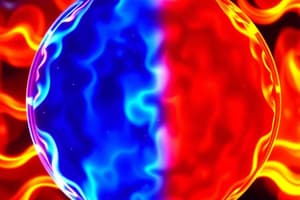Podcast
Questions and Answers
Mae cyfernod perfformiad ar gyfer oerydd Carnot yn annibynnol ar y math o oeryddion.
Mae cyfernod perfformiad ar gyfer oerydd Carnot yn annibynnol ar y math o oeryddion.
False (B)
Gellir trosi gwres a gwaith yn rhyng-gyfnewidiol gyda'r agosrwydd i 100% o effeithlonrwydd
Gellir trosi gwres a gwaith yn rhyng-gyfnewidiol gyda'r agosrwydd i 100% o effeithlonrwydd
False (B)
Flashcards
Offeryn
Offeryn
Mae'r term hwn yn cyfeirio at rhywbeth sy'n cael ei ddefnyddio i gyflawni gweithgaredd penodol neu i gyflawni gwaith, fel offeryn neu gyfrwng.
Proses
Proses
Mae'r term hwn yn cyfeirio at y pethau sy'n digwydd o fewn rhywbeth, neu'r ffordd y mae rhywbeth yn gweithio.
Parth
Parth
Mae'r term hwn yn cyfeirio at ystod o feysydd neu bynciau sy'n cael eu trafod neu'n cael eu harchwilio.
Pwysig
Pwysig
Signup and view all the flashcards
Lleoliad
Lleoliad
Signup and view all the flashcards
Fformat
Fformat
Signup and view all the flashcards
Nod
Nod
Signup and view all the flashcards
Dull
Dull
Signup and view all the flashcards
Staff
Staff
Signup and view all the flashcards
Canlyniadau
Canlyniadau
Signup and view all the flashcards
Ffenomen
Ffenomen
Signup and view all the flashcards
Strategaeth
Strategaeth
Signup and view all the flashcards
Safbwynt
Safbwynt
Signup and view all the flashcards
Dysgu
Dysgu
Signup and view all the flashcards
Elfen
Elfen
Signup and view all the flashcards
Techneg
Techneg
Signup and view all the flashcards
Cysylltiad
Cysylltiad
Signup and view all the flashcards
Cyd-destun
Cyd-destun
Signup and view all the flashcards
Datblygiad
Datblygiad
Signup and view all the flashcards
Eglurhad
Eglurhad
Signup and view all the flashcards
Cydrannau
Cydrannau
Signup and view all the flashcards
Cyfuniad
Cyfuniad
Signup and view all the flashcards
Graddfa
Graddfa
Signup and view all the flashcards
Cymhlethdod
Cymhlethdod
Signup and view all the flashcards
Dehongliad
Dehongliad
Signup and view all the flashcards
Cyfle
Cyfle
Signup and view all the flashcards
Penderfyniad
Penderfyniad
Signup and view all the flashcards
Dadansoddiad
Dadansoddiad
Signup and view all the flashcards
Awtomatig
Awtomatig
Signup and view all the flashcards
Cyflym
Cyflym
Signup and view all the flashcards
Ychwanegol
Ychwanegol
Signup and view all the flashcards
Mewn gwirionedd
Mewn gwirionedd
Signup and view all the flashcards
Dosbarthiad
Dosbarthiad
Signup and view all the flashcards
Study Notes
Thermodynamics Study Notes
-
Heat Effects & Phase Transitions:
- Latent heat describes energy changes during phase transitions (e.g., melting, vaporization).
- Sensible heat refers to energy changes associated with changes in temperature.
- Heat of combustion describes energy released during a combustion reaction.
- Heat of formation refers to energy absorbed or released when a compound is formed from its elements.
-
Critical Point & Equations of State:
- At the critical point, the liquid and gas phases become indistinguishable, and a cubic equation of state has one real value among the three solutions.
-
Cascade Refrigeration Systems:
- A two-stage cascade system uses two cycles to achieve lower cooling temperatures.
- The second cycle (cycle 2) operates closer to the desired cooling temperature.
- This arrangement is useful for specific cooling applications.
-
Energy in Transit:
- Heat is considered a form of energy in transit.
- Kinetic and potential energy, internal energy, are not considered energy in transit.
-
Liquid Properties & Pressure:
- Isothermal compressibility relates changes in volume to pressure at constant temperature.
- Compresibility factor is helpful to relate ideal gas behavior.
-
Carnot Cycle & Efficiency:
- The Carnot cycle, an ideal thermodynamic cycle, has maximum efficiency for a given temperature range.
- Expressed generally as a function of temperature.
-
Compressor Efficiency:
- Compressor efficiency is a measure of how efficiently the compressor converts input work into fluid flow work.
- The efficiency is a ratio of ideal work to the actual work.
-
Reversible Processes:
- Reversible processes are those that can be reversed without leaving any effect on the surrounding system.
- Frictionless processes and equilibrium states are characteristics of reversible processes.
-
Two-Phase Region (Fluid):
- The CEOS solution with the greatest value for a fluid in a two-phase region represents the vapor/vapor-like solution.
-
Steam Power Plants:
- Increased boiler pressure increases thermal efficiency in a steam power plant.
- Refrigerant characteristics are crucial for condenser and evaporator operations.
-
Refrigerant Specifications:
- Essential refrigerant property is it has a higher vapor pressure than the atmospheric pressure, and lower vapor pressure at evaporator temperature.
-
Carnot Refrigerator:
- Coefficient of performance (COP) for a Carnot refrigerator is independent of the type of refrigerants.
-
Isothermal & Isobaric Processes:
- Adiabatic processes allow a measure of work.
- Carnot cycle is used in an idealised closed system.
- Mechanical reversible and isothermal process have zero change in internal energy.
- Work is a change in energy between an open system and surroundings.
-
State Functions:
- State functions do not depend on the path taken to reach a particular state.
- State functions depend only on present state independent of how or where they were achieved.
-
Equations of State:
- Equations of state describe the relationship between pressure, volume, temperature, and composition of a substance.
- These models allow for predictions of the behavior of fluids and are very important in thermochemistry and chemical engineering.
-
Internal Energy & Heat Transfer:
- Internal energy of a substance is the sum of all microscopic energies within the substance.
- Heat transfer is energy transfer between two objects at different temperatures from higher to lower. Internal energy isn't transferred.
- For a closed system, the changes or variations of Q+W are related to the changes in internal energy of the system.
-
Refrigerants & Montreal Protocol:
- The Montreal Protocol is an international treaty to phase out refrigerants that harm the ozone layer.
-
Critical Point: -The critical point is a state where the liquid and gas phases become indistinguishable.
-
Flow Processes: -When the process is reversible, the heat transfer to the surroundings is zero and the heat energy is conserved.
-
Refrigeration Effect:
- Refrigeration effect per unit of work is described by a relation with temperature.
-
Steam Power Plant Thermal Efficiency:
- Higher condensing temperature leads to increased thermal efficiency.
-
Entropy Change:
- Entropy change during a process depends on the path followed.
-
Heat Capacity:
- Constant Pressure heat capacity (Cp) and constant volume heat capacity (Cv) are intrinsic physical properties of any substances.
-
Carnot Efficiency:
- Carnot efficiency depends only on the temperature levels and not on working substance.
-
Phase Change Enthalpy:
- Enthalpy of Vaporization is proportional to the slope InPsat vs 1/T.
Studying That Suits You
Use AI to generate personalized quizzes and flashcards to suit your learning preferences.




